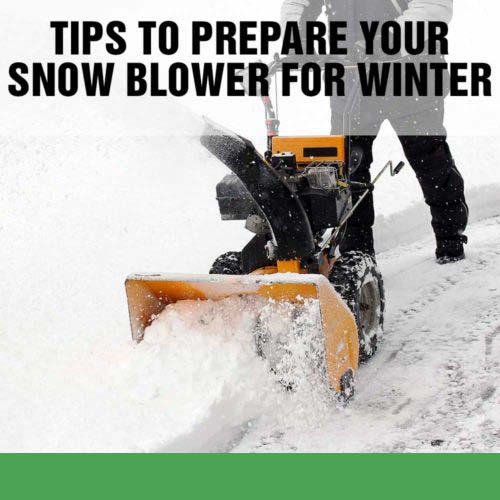Whether you’re prepping your snow blower for another year of snow removal or getting your new machine ready for its first winter, these snow blower maintenance tips will help ensure you’re prepared for snow this winter.
Tip #1
Change the oil in your snow blower. This should also be done after the first five hours of use this winter and after every subsequent season.
Old oil can cause problems for your machine’s engine, making it hard to start. If there is old oil, dispose of it properly. There is an oil drain plug in the back of your snow blower. Use a wrench to remove the plug and drain the oil into a container.
Tip #2
Drain old fuel and replace with fresh fuel. Old fuel can cause problems for your blower’s engine, making it hard to start.
Also, consider adding a fuel stabilizer so your fuel stays fresh even if you don’t need to use your snow blower.
Tip #3
Install a new spark plug, if necessary. Check your spark plug at the start of each season.
Disconnect the spark plug lead from the spark plug. Remove the spark plug with a spark plug socket wrench and remove debris from around the spark plug. Examine your spark plug and check for any damage. If there is damage, rust or corrosion on your snow blower’s spark plug, replace the spark plug.
Tip #4
Make sure all parts are moving smoothly. Make sure you tighten loose nuts and bolts. Your snow blower may vibrate during operation, causing nuts and bolts to loosen. Tighten those up to prevent them from falling off when your snow blower is in use.
Additionally, check to make sure belts and cables are in good condition. If you spot any damage, replace them. Any significant wear and tear call for a replacement to avoid the danger of a belt breaking during use.
After your snow blower is prepared for winter, start it up and let it run for a few minutes in a well-ventilated area to be certain everything works properly. Consider starting your machine every so often if it sits for an extended period.
Note: Not all snow blowers are the same. Different snow blowers utilize different types of fuel, oil and screws so consult your owner’s manual before repairing your equipment.
Tips to Prepare your Snow Blower for Winter

